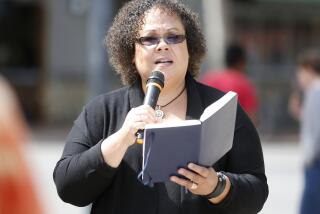Lansdale Meets With Senator Seeking Her Resignation : Education: The CSU chairwoman tells him she was wrong for claiming she had an AA but she won’t step down.
- Share via
SACRAMENTO — Completing her round of apologies and explanations, CSU Trustee Chairwoman Marianthi Lansdale met with the state’s most powerful senator Tuesday to discuss why she claimed a community college degree she hadn’t earned during her appointment and confirmation in 1986.
Marianthi Lansdale, a part-time Huntington Beach resident, met with Senate President Pro Tempore David A. Roberti (D-Los Angeles) to concede that she erred in claiming she had earned the degree but vigorously defended her accomplishments as a trustee and indicated that she would not step down.
Roberti called for Lansdale’s resignation when the California State University chairwoman admitted in a December interview with The Times that she did not obtain an associate of arts degree in literature from Long Beach City College in 1959 as she claimed on her resume. Lansdale was appointed to the prestigious higher education panel by Gov. George Deukmejian in 1985 and confirmed by the Senate in 1986.
Since the disclosure, Lansdale has issued a public apology for the misstatement of her background and offered to meet with Roberti to discuss the controversy. In early January, her colleagues on the board of trustees issued a unanimous vote of confidence in her leadership of the 24-member panel, which exercises broad control over 20 campuses.
Meanwhile, Lansdale also apologized privately to Deukmejian, to whom Lansdale and her husband contributed more than $100,000 during the 1982 gubernatorial campaign. Deukmejian said last month that the falsification was a “bad mistake” but that he would not ask Lansdale to resign.
Deukmejian’s remarks were a clear signal that Lansdale would stay on the board, since the Senate currently has no power to invalidate its confirmation. But Lansdale, accompanied by CSU Chancellor W. Ann Reynolds, kept her commitment Tuesday to meet with Roberti to try to mend fences.
After a half-hour closed session, Roberti said he renewed his request that Lansdale step down from the board. But he added, “There is nothing I can do.
“My specific responsibility is to guard the confirmation process, and an error was made,” he said. “In most appointments, I guess that wouldn’t be a significant error, but in an educational appointment, it was an error of significance.”
Roberti said Lansdale conceded the error but indicated that she would not step down.
“She and Chancellor Reynolds went through a whole list of things Mrs. Lansdale has been involved in--child care, minority hiring. It was well-taken and an important statement as to what she is doing in her position,” Roberti said.
The Lansdale controversy has inspired a piece of legislation that would give the Senate the power to expel gubernatorial appointees who are found to falsify their educational credentials, which would be submitted to the Senate under penalty of perjury.
In addition, Sen. Daniel E. Boatwright (D-Concord) said Tuesday that he is drafting legislation to establish minimum requirements for appointees to the CSU and community college governing boards. Community college appointees would be required to have at least an AA degree, while CSU board members would need a bachelor’s degree, he said.
“I was really amazed that there was no educational criteria for appointment to the state college trustees,” Boatwright said. “When the Lansdale story broke, that’s when I first became aware that there was no educational requirement to be a state college trustee or a member of the community college board of trustees.
“I had always assumed that if you were going to govern, say, the CSU system that you would have had to know something about it, would have had to experience the problems of getting a BS or a BA degree,” he said. “To me, this highlighted the need for legislation.”
Currently, there are no educational qualifications for the trustees, who are political appointees. A CSU spokesman said that at least 10 of the 96 trustees since 1960 have not had college degrees.
More to Read
Sign up for Essential California
The most important California stories and recommendations in your inbox every morning.
You may occasionally receive promotional content from the Los Angeles Times.










